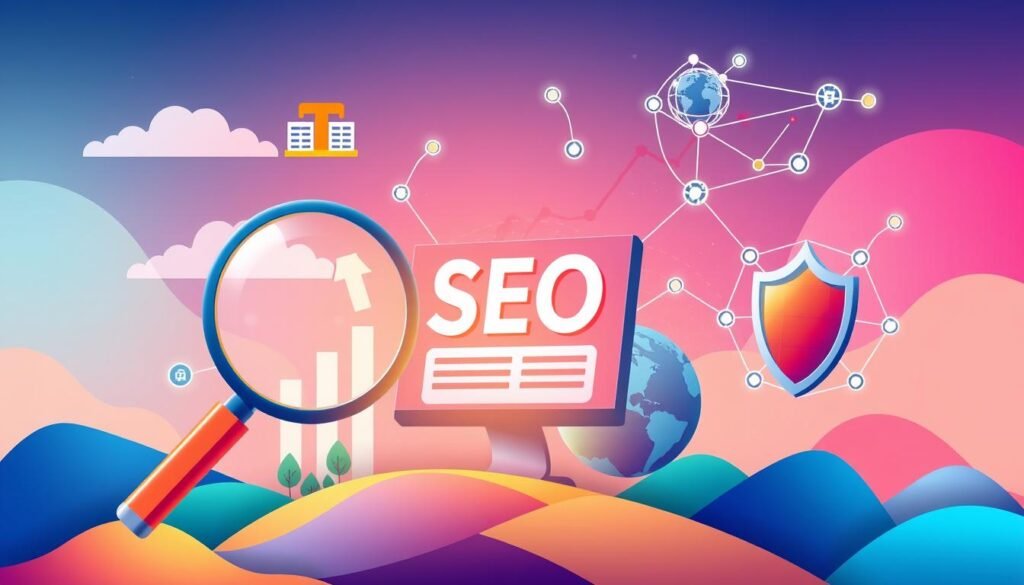In today’s digital world, website security is more important than ever. A huge1 358% jump in cybercrimes from 2019 to 2020, and then a 125% increase in 2021, shows how critical it is. Companies hit by data breaches in 2022 lost an average of $4.35 million. This is a harsh reminder of what happens when a website isn’t secure2.
As we move through the digital landscape, knowing the difference between SEO and WAFs is key. It helps keep your website safe and visible online.
Key Takeaways
- Website security is essential for protecting business operations, data, and reputation.
- SEO and WAFs play complementary roles in ensuring a website’s online visibility and security.
- Implementing a robust WAF can enhance website security and improve SEO performance.
- HTTPS and SSL certificates are critical for both SEO and website security.
- Ongoing threat detection and website monitoring are vital for maintaining a secure and optimized online presence.
Introduction to Website Security
In today’s digital world, keeping your website safe is a top priority. Website security means protecting your online space from harm or theft. It’s key for businesses to stop intruders and keep their systems running smoothly3.
The Importance of Securing Your Website
Having a secure website is essential. An insecure site can face cyber-attacks, lose valuable data, and harm your reputation3. It’s important to keep your encryption updated and watch for new threats3. Tools like web application firewalls (WAFs) and vulnerability scanners help keep your site safe3.
The Consequences of an Insecure Website
An insecure website might get blacklisted or get bad reviews. This can hurt your search engine ranking performance3. Cyberattacks can also cost small businesses a lot of money4. Plus, one in four Americans might leave your business after a data breach4.
https://www.youtube.com/watch?v=zUsF93-_skY
“Securing your website is critical. An insecure site can lead to cyber-attacks, data theft, and damage to your reputation.”
In summary, website security is vital for a successful online presence. By understanding the need for security and the risks of an insecure site, you can protect your online assets and reputation34.
Understanding SEO (Search Engine Optimization)
SEO, or Search Engine Optimization, makes websites more visible on search engine results pages (SERPs). It’s key for online marketing. It helps businesses get more visitors and be found by their audience.
What is SEO and Why is it Important?
SEO makes a website better for search engines. It uses techniques like keyword research and link building. These help a site rank higher5.
SEO brings in more visitors who are likely to buy or engage. Google looks at speed, security, and mobile-friendliness when ranking sites5. Good SEO makes a site easier to find and use, boosting marketing efforts6.
SEO keeps getting more complex as search engines and users change. Staying current with SEO best practices is vital. This way, businesses can keep their online edge6.

“Ranking high on search engines is not just about getting more traffic – it’s about getting the right traffic, the kind that converts.” – Unknown
In short, SEO is vital for online success. It boosts website visibility, drives targeted traffic, and improves rankings. This enhances overall online performance56.
Understanding WAF (Web Application Firewall)
A web application firewall (WAF) is a key security tool. It guards web apps by watching and filtering internet traffic7. WAFs fight off many cyber threats, like cross-site scripting and SQL injection8. They check the data in server requests and responses to spot and stop security risks fast.
What is a WAF and How Does it Work?
A WAF sits between your web app and the internet, at Layer 7 of the OSI model8. It uses pattern matching and machine learning to block common attacks8. When it finds bad code or odd activity, it can clean it, log it, or alert you.
WAFs come in cloud-based (SaaS) and on-premises versions, meeting different needs8. They’re key to a strong web app security plan, helping against new threats8. They also help with DDoS attacks, slow down requests, and limit rates, boosting web app security8.
Even though WAFs are great at stopping web attacks, they shouldn’t be the only security measure8. Developers must fix vulnerabilities and use a complete security plan. This includes WAFs working with other security tools for the best protection8.

The Role of Website Security in SEO
Website security is key in search engine optimization (SEO). Google says HTTPS is a ranking signal, helping sites rank higher9. Sites with HTTPS and SSL certificates might rank better because Google sees these as security signals9.
Strong security protects users and boosts a site’s SEO. Security steps are part of Google’s ranking criteria. Keeping security up to date, including software updates and scans, is vital for a site’s security and SEO9.
- Search engines favor secure sites, giving them better rankings10
- Secure sites make users more confident10
- Secure sites get more organic traffic and better rankings10
- HTTPS encryption protects user data and boosts SEO10
Tools like web application firewalls (WAF) and content delivery networks (CDN) add extra protection. They help against malware and DDoS attacks, improving a site’s security and SEO9.
| Security Measure | Priority Level | Influence on SEO |
|---|---|---|
| Implementing HTTPS | 100 | 90 |
| Using SSL/TLS Certificates | 100 | 80 |
| Regular Software Updates | 95 | 60 |
| Implementing a Web Application Firewall (WAF) | 80 | 55 |
| Regular Security Audits and Scans | 85 | 70 |
By focusing on website security, organizations protect their digital assets and boost their SEO. This leads to more visibility, trust, and organic traffic1011.

SEO vs WAF: Key Differences
SEO and WAF are important for website security and optimization. SEO helps a website show up better in search results. WAF protects the site from cyber threats and attacks.
Purpose and Functionality
SEO uses techniques like keyword optimization and content creation to boost a website’s visibility. WAF, on the other hand, defends against cyber threats. It blocks attacks like those in the OWASP Top 10 with high accuracy12.
Implementation and Deployment
SEO is an ongoing effort to keep a website ranking high. WAF needs setup to start protecting the site. SiteLock’s WAF can be set up in just five minutes12.
WAF solutions can tell real visitors from malicious traffic. They block attacks like XSS and SQL injection12. SiteLock also blocks bad bots12.
WAF solutions come in hardware, software, and cloud-based types12. Cloud-based WAFs, like Sucuri, are easy to set up and don’t need installation13. They work with any platform13.
SEO and WAF work together to improve a website’s performance and security. By balancing these two, website owners can ensure their site is both optimized and protected.
| Feature | SEO | WAF |
|---|---|---|
| Purpose | Improve website visibility and ranking in search engines | Protect website from cyber threats and attacks |
| Techniques | Keyword optimization, content creation, link building | Threat detection, traffic filtering, security protocols |
| Implementation | Ongoing process of optimization and monitoring | Initial setup and configuration to protect the website |
| Deployment | Integrated within the website | Hardware-based, software-based, and cloud-based solutions |
| Benefits | Increased organic traffic and higher search engine rankings | Protection against web application security risks, improved website performance, and bot mitigation |
“A well-designed and executed SEO strategy, coupled with robust WAF protection, can significantly enhance a website’s overall performance and security.”
Understanding SEO and WAF differences helps website owners create a strong online presence. They balance visibility, optimization, and security effectively1213.
HTTPS and SSL Certificates
In today’s digital world, website security is key. HTTPS and SSL certificates are vital for a safe online presence14. They boost website security and help with SEO too.
The Importance of HTTPS and SSL for SEO and Security
Google values website security for better rankings14. It promotes “HTTPS Everywhere” for safer browsing. Websites with HTTPS and SSL rank higher in search results14.
HTTPS needs an SSL certificate for secure data encryption15. This encryption keeps user data safe, like login and payment info15.
Using HTTPS and SSL improves SEO and website security14. A “Secure” label in the address bar builds trust. This leads to more engagement, conversions, and better rankings14.

SSL certificates are just part of website security14. True security involves protection, detection, response, and backups14. Website owners should use a Website Security Platform for full protection14.
“SSL certificates represent only a small piece of the website security puzzle, stressing the need for a complete security strategy beyond encryption.”
Threat Detection and Website Monitoring
Keeping your website safe and secure is key in today’s digital world. Threat detection and website monitoring are vital for a strong cybersecurity plan. They help find and fix weaknesses before hackers can use them16.
Using vulnerability scanners, we can check our systems and apps for weaknesses. These tools find many threats, like SQL injections and XSS attacks, as listed in the OWASP Top 1017.
Website monitoring does more than just find vulnerabilities. It also alerts us to security issues, so we can fix them fast. It watches for unauthorized access, data breaches, and other threats that could harm our site17.
By always scanning for threats and monitoring our website’s security, we stay ahead of cybercriminals. This protects our business and customers. It also helps our website’s search engine optimization (SEO) by keeping it reliable and trustworthy16.
“Vigilance and proactive security measures are the keys to maintaining a secure and well-performing website in today’s digital landscape.”
To keep our website safe, we work with top providers of website security solutions. They offer advanced threat detection and website monitoring. With these tools and practices, we can safely face the changing cybersecurity world and protect our online space18.
For more details on how to improve your website’s security and performance, please contact us. Our team is ready to help businesses like yours have a secure and optimized online presence16.
Filtering Incoming and Outgoing Traffic
A web application firewall (WAF) is key in keeping websites safe from cyber threats19. It watches and filters traffic to catch and stop bad activities. This includes attacks like injection and cross-site scripting, and other big threats20.
WAFs can also be set up to block fake traffic and send a warning to attackers19.
The Role of WAF in Traffic Filtering
WAFs protect against many dangers like SQL injections and DDoS attacks20. They can be set up in different ways, like on a host, network, or in the cloud20. Cloud-based solutions are affordable, with costs based on a monthly or yearly fee20.
Today’s WAFs use both allowlisting and blocklisting to improve security21. A WordPress WAF uses advanced methods to keep sites safe21.
By 2032, the WAF market is expected to hit $18.2 Billion21. WAFs use signatures to spot known attacks and learn from traffic patterns21.
“WAFs can help enforce rule-based access control, boosting visibility and reporting capabilities and allowing the setting and enforcement of security protocols.”20
Securing Remotely Hosted Applications
In today’s world, keeping applications safe when accessed remotely is key. Solutions like clientless SSL VPNs offer secure remote access to web apps. This lets employees get to the resources they need from anywhere22. These VPNs also have a web application firewall (WAF) to add more security. They protect against common web threats22.
A WAF watches and filters traffic between web apps and the internet. It blocks bad requests that try to harm the system. This keeps the system and data safe, making remote work possible and secure23.
Cloud security is vital for keeping applications safe22. Cloud-based WAFs are managed by third-party providers. They offer scalable and affordable security, perfect for cloud-based apps22. These solutions help meet important standards like PCI DSS and GDPR22.
Using a web VPN and WAF together protects web app security and data232422. This way, employees can safely access what they need. The company keeps its data and systems safe23.
In summary, keeping applications safe when accessed remotely is critical today. By using web VPNs and WAFs, businesses can ensure secure remote access. They also protect against web threats and keep data safe232422.
seo vs waf : Striking the Right Balance
Businesses need to find a balance between SEO and WAF security for a strong online presence. SEO makes your site more visible to your audience. WAF protects it from cyber threats25. By focusing on both, your site will rank well and stay safe from attacks26.
SEO makes your site easier to find, bringing more visitors25. WAF keeps your site safe from harm, like data breaches26. Ignoring either can harm your site’s visibility or put customer data at risk.
It’s important to balance SEO and WAF. With good SEO and a strong WAF, your site will perform well and stay secure. This approach boosts your site’s performance and keeps customer data safe.
Finding the right balance between SEO and WAF is key for your online success. By focusing on both, your site will be user-friendly and secure. This helps your business grow in the digital world.
Conclusion
In today’s digital world, having a safe and fast website is key for businesses to thrive online. Website security, SEO, and WAF work together to keep our site safe and seen. By knowing how they differ, we can make a plan that improves our site’s search ranking and keeps it safe from threats27.
Strong cybersecurity steps, like HTTPS and a good WAF, protect our site and make it more visible. Google says a secure site is more likely to rank higher. If our site gets hacked, our ranking and visitors can drop a lot2728.
By finding the right mix of SEO and WAF, we can build a safe and effective online space. This approach builds trust with our visitors, keeps our data safe, and helps our business grow. In today’s digital world, keeping our online presence secure and visible is vital for our success2728.
FAQ
What is the importance of website security?
What is the difference between SEO and WAF?
How does website security impact SEO performance?
What is the role of a web application firewall (WAF) in website security?
Why is securing remotely hosted applications critical?
Source Links
- What Is The Difference Between Web Security And Website Security? – https://mignet.io/difference-between-web-security-and-website-security/
- What Does A Web Application Firewall Do? – Blue Compass – https://www.bluecompass.com/blog/what-does-a-web-application-firewall-do
- Web security and Website Security | Fortinet – https://www.fortinet.com/resources/cyberglossary/what-is-web-security
- What Is Website Security & How to Secure Your Site – https://www.sitelock.com/blog/what-is-website-security/
- SEO and Web Servers: What You Need to Know – https://www.alibabacloud.com/tech-news/a/web_server/4oh4newk6vi-seo-and-web-servers-what-you-need-to-know
- Web Development vs SEO: how do they complement each other? – https://rockcontent.com/blog/web-development-vs-seo/
- Understanding the SEO Benefits of Implementing a Web Application Firewall – https://opsmatters.com/posts/understanding-seo-benefits-implementing-web-application-firewall
- Web Application Firewall (WAF) – https://www.invicti.com/learn/web-application-firewall-waf/
- The role of website security in technical SEO – E-Sutra Technologies – https://e-sutra.com/seo/the-role-of-website-security-in-technical-seo/
- Boost SEO and User Trust with Strong Website Security – https://eternitymarketing.com/blog/how-website-security-builds-user-trust-and-boosts-seo
- The impact of cyber security on SEO: My guide – https://ralfvanveen.com/en/news/the-impact-of-cyber-security-on-seo/
- Web Application Firewall (WAF) – Site Protection Solutions – https://www.sitelock.com/web-application-firewall-waf/
- What is a Web Application Firewall? – https://sucuri.net/guides/what-is-a-waf/
- SSL vs. Website Security – https://blog.sucuri.net/2018/09/ssl-vs-website-security.html
- WAF is not SSL: Why you need both for proper website security – https://www.godaddy.com/resources/skills/waf-ssl-for-website-security
- Should I consider a WAF (Web application firewall) as part of my website security? – https://stream.net.nz/Should-I-consider-a-WAF-Web-application-firewall-as-part-of-my-website-security/7157-132fbd1c-4113-4fc5-b7b4-f45fddef3e04-p1/
- Website Security Monitoring & Malware Protection – https://www.sitelock.com/
- Website Security | Web Application Firewall (WAF) | TheGigabit – https://thegigabit.com/security/web-application-firewall/
- Traffic Filter Rules including WAF Rules | Adobe Experience Manager – https://experienceleague.adobe.com/en/docs/experience-manager-cloud-service/content/security/traffic-filter-rules-including-waf
- What is a WAF? | Web Application Firewall explained | ESDS – https://www.esds.co.in/blog/what-is-waf-and-how-important-is-it-to-your-business/
- What Is a WordPress Web Application Firewall (WAF) & How Can You Use It? – https://comodosslstore.com/blog/what-is-a-wordpress-web-application-firewall-waf-how-can-you-use-it.html
- Web Application Firewalls (WAFs): Everything You Need to Know – https://ultahost.com/blog/web-application-firewalls/
- Why is Website Security Important for SEO? | ESDS – https://www.esds.co.in/blog/why-is-website-security-important-for-seo-how-can-esds-help/
- How can you protect your web application using a WAF? – https://www.linkedin.com/advice/0/how-can-you-protect-your-web-application-using
- SEO vs WAF Dream11 Prediction, Fantasy Stats, Venue Report, Recent Performances, Probable XIs, Overall T20 Records, Toss Based Analysis, C/VC Choices – Match 3 – https://www.fantasyarena.in/article/3582/seo-vs-waf-dream11-prediction-fantasy-stats-venue-report-recent-performances-probable-xis-overall-t20-records-toss-based-analysis-cvc-choices-match-3
- 7 Ways to Ensure Your Website is Secure – https://www.rankpay.com/7-ways-to-ensure-your-website-is-secure/
- The Importance of Website Security for SEO: (20 Strategies to Enhance Website Security for Better SEO) – https://www.linkedin.com/pulse/importance-website-security-seo-20-strategies-enhance-shrivastava-kemac
- Boost Your SEO: Secure Your Site with HTTPS & More! – https://asymmetric.pro/secure-your-site-to-increase-seo-and-ux/
